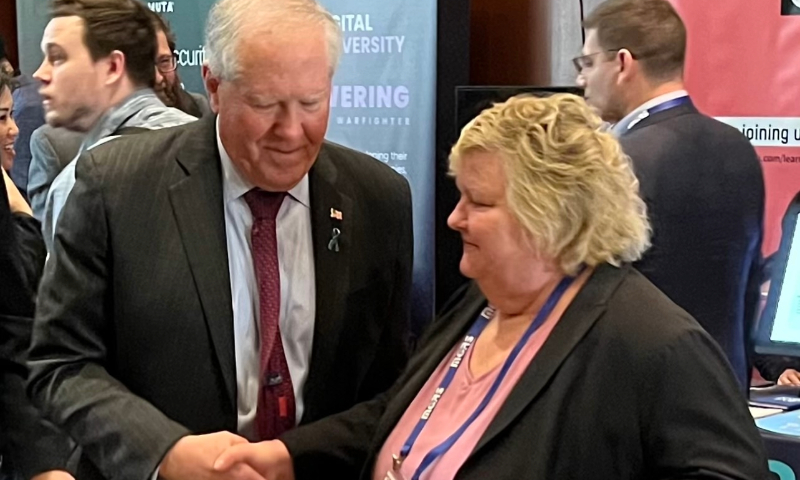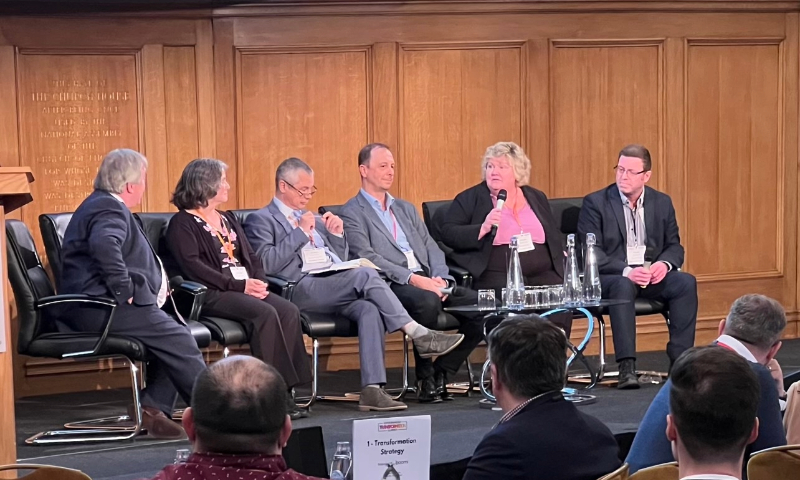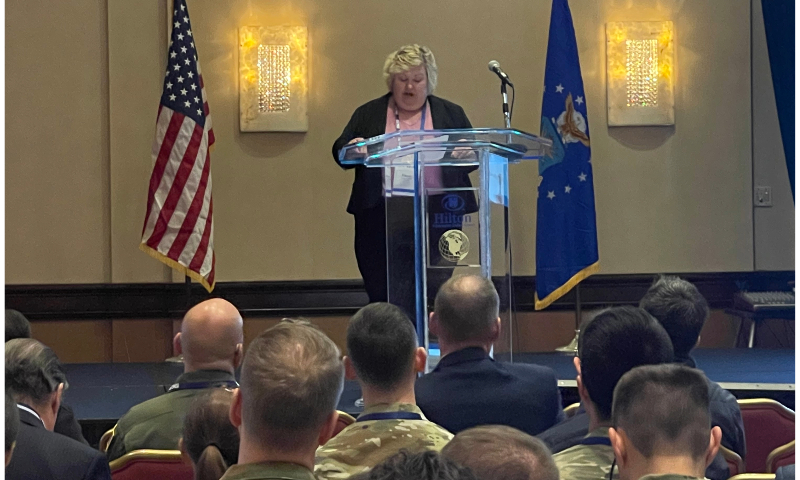Ms. Eileen Vidrine, a member of the Senior Executive Service, currently serves as the Department of the Air Force Chief Data and Artificial Intelligence Officer. She develops and implements strategies for enterprise data management, analytics, digital transformation, and responsible and ethical artificial intelligence to optimize performance and drive innovation in and across all missions and operations.
Recently, in an exclusive interview with Digital First Magazine, Ms. Vidrine shared her career trajectory, insights on diversity and inclusion, significant career milestones, personal role model, future plans, pearls of wisdom, and much more. The following excerpts are taken from the interview.
Eileen, can you walk us through your journey into technology and what drew you into the AI space?
My journey into technology started when I enlisted in the U.S. Army in 1986. As a Transportation Officer, I became familiar with the importance of technology in supporting logistics operations. Later in my Army career, I was selected into the U.S. Army Acquisition Corps, working on complex technology acquisition programs. My civilian career began at the Joint Military Intelligence College, where I led the college’s technology transformation effort as the Center for Educational Technologies director. This experience sparked my interest in data and technology innovation. As I progressed into more senior roles, I became increasingly interested in the potential of AI to transform the government’s ability to deliver services, secure the nation, and support our warfighters. I am passionate about ensuring that AI is used responsibly and ethically and that its potential is fully realized to support our missions.
Tell us about your current roles and responsibilities as Chief Data and Artificial Intelligence Officer at the United States Department of the Air Force.
As Chief Data and Artificial Intelligence Officer for the Department of the Air Force, my primary roles and responsibilities are to develop and implement strategies for enterprise data management, analytics, digital transformation, and responsible/ethical artificial intelligence. My team works closely with our Air Force and Space Force leadership, industry partners, and other government agencies in this capacity. Our team is laser focused on opportunities to optimize performance, drive innovation, and ensure that we leverage the latest technology to support our missions. I am committed to continue to foster a culture of data-driven decision-making across the organization.
In your current role, what kind of challenges do you face and how do you overcome them?
One of the main challenges we face is balancing the need for innovation and agility with the need for security and risk management. We must find ways to harness emerging technologies like AI while ensuring that they are being used responsibly and ethically. To overcome these challenges, I work closely with our security leaders across our enterprise to identify potential risks and develop strategies to mitigate them. Our CDAO Team also collaborates with industry partners and government agencies to stay informed about emerging best practices and approaches.
What are your thoughts on diversity and inclusion? How important is it to have authentic conversations with leaders, professionals, and changemakers to create more acceptance across the globe?
Diversity and inclusion are critical to the success of any organization. It is essential to have authentic conversations with leaders, professionals, and changemakers to create more acceptance across the globe. In the AI space, it is especially important to ensure that we are building fair, transparent, and unbiased systems. To achieve this, we must have diverse perspectives at the table. I work to promote diversity and inclusion across the organization and ensure that we build trustworthy and equitable AI systems.

What is the one thing you have accomplished in your career that you’re extremely proud of and do you have any specific goals for 2024?
Throughout my time in the Department of the Air Force, I have had the privilege of leading the establishment of the Chief Data Office from start-up to full operating capability. This achievement is one of the most impactful accomplishments of my career, and I am incredibly proud of the work my team and I have accomplished.
When I first joined the organization, the Chief Data Office was not even listed on the official organization chart. However, with a lean team of citizen airmen, we worked tirelessly to hit milestone after milestone and provide critical capabilities to empower airmen and guardians at tactical and strategic levels. Our efforts were not only acknowledged by our organization, but also recognized by the Department as a whole.
Looking ahead to the year 2024, my goal is to continue driving innovation in the data and artificial intelligence arenas. With digital transformation taking place at a rapid pace, there is a tremendous runway for the future to take off. I am dedicated to ensuring that the Department of the Air Force remains at the forefront of these critical capabilities, providing airmen and guardians with the data-driven insights they need to make informed decisions and achieve mission success.
I am excited about the expanding responsibilities of the now Chief Data and Artificial Intelligence Office in the portfolio of AI. By leveraging these capabilities, we can unlock new doors and greatly enhance our operational performance. With a focus on innovation and collaboration, I am confident that we will be able to achieve our goals and continue making a positive impact on the Department of the Air Force and the wider defense community.
Can you name a person who has had a tremendous impact on you as a leader? Maybe someone who has been a mentor to you? Why and how did this person impact your life?
While I have been very fortunate to serve under many amazing leaders throughout my career, there is one person who has had a truly tremendous impact on me as a leader – my father. From a very young age, my father instilled in me a sense of patriotism and taught me to love and value my country. He also taught me the importance of hard work and instilled in me a grit and determination to never give up, no matter how difficult the challenge.
Perhaps most importantly, my father taught me the importance of leading with humility and empathy and valuing diverse perspectives. He challenged me to think creatively and outside the box, and to constantly strive to be a little bit better, a little bit stronger week to week, month to month. He also stressed the importance of lifelong learning and advocated for education as an opportunity to invest in oneself and stay abreast of emerging technologies and trends.
Thanks to my father’s mentorship and guidance, I have developed a strong commitment to mentorship myself, and to fostering the next generation of leaders. I strive to live up to his high standards in all areas of my life.
Overall, I feel incredibly fortunate to have had such a strong role model and mentor in my life, and I am grateful for the impact that he has had on me as a leader. Thanks to his guidance and lessons, I feel empowered to continue growing as a leader, and to help others do the same.

What is it that motivates and inspires you in your everyday life?
As the Chief Data and AI Officer for the Department of the Air Force, my work is driven by a deep sense of commitment to our national security and working alongside a team of exceptional individuals who share that same desire. The opportunity to lead an amazing team that dedicates their time, talent, and energy to ensuring that our military capabilities are at their peak fills me with a sense of pride and purpose. It’s an incredible feeling to wake up each day knowing that we are working towards a noble and important cause.
Our team is a group of incredibly talented and passionate individuals who are dedicated to the mission of protecting our country. We work together to develop innovative solutions that leverage data and AI to optimize performance, improve operations, and safeguard those who serve our country. The value of our work is evident and impactful, and we are constantly looking towards the future, striving to make a difference.
Despite the challenges that we face, the hard work and perseverance of our team, and the country, is what keeps us moving forward. We understand that the work we do matters, and that motivates us to continue pushing ourselves to be our best. Honoring the legacy of excellence that is synonymous with the USAF, we strive to do our part in maintaining the highest standards of performance and service.
It’s an honor to lead such a team, and I feel privileged to be able to apply my skills and expertise towards a cause that is greater than myself.
What is the one lesson learnt that’s unique to being a woman leader?
As a woman leader, the one lesson that I have learned is the importance of being prepared to face challenges and take risks. I have fundamentally learned – as a woman leader and in general – that leadership requires an unyielding level of readiness and determination, regardless of the circumstances. To lead, you must be seeking to improve your knowledge, competencies, and technical skills continuously, while inspiring and leading your team by example. Leadership is a continuous journey of self-improvement, growth, and learning. Perhaps even more so as a woman, leading involves an uncommon willingness to take risks, challenge the status quo, and be confident enough to lead despite uncertainty or discomfort. I’ve learned as a woman leader to be ready to face challenges head-on, with the knowledge that the road to success is not always smooth.

Which technology are you investing in now to prepare for the future?
As the Department of the Air Force acknowledges the importance of staying ahead of the curve, we have identified several technologies that are pivotal to invest in for preparing towards a better future. One of the most crucial technological advancements that we are focusing on is the development of responsible and ethical artificial intelligence systems.
In our pursuit of utilizing AI systems, we aim to create systems that can fully support effective decision-making and enhance our operational capabilities in various aspects. Our focus is on developing AI systems that are responsible and ethical to uphold the highest standards and practices. In this regard, we have adopted a forward-leaning approach through experiments, testing, and piloting, leaving no room for assumptions but for solid findings.
We also believe in investing in people as our most valuable asset, both for today and tomorrow. Investing in essential training programs is an integral part of our strategy to empower people with the skills and knowledge they need to harness the enormous potential of these advanced systems.
Ultimately, the Department of the Air Force is investing in a range of technologies, including responsible and ethical artificial intelligence systems, advanced analytics and enterprise data management, and emerging technologies. Our investments are not limited to technology alone, as we also prioritize advancing our people.
If you could give one piece of advice to professionals starting out in the tech industry, what would it be?
If there is one piece of advice that I could give to those beginning their journey in the tech industry, it would be to stay curious and embrace continuous learning. Technology is a field that is constantly changing, and to succeed in it, one must be willing to adapt and learn new skills. With each new technological advancement comes an opportunity to learn something new and explore different areas of expertise.
I realize this goes beyond one piece of advice, but it’s also important to understand that in the tech industry, teamwork is critical. Projects are complex and require different perspectives and experiences to be successful. Collaborating with colleagues, partners, and vendors to develop innovative solutions that meet organizational needs is the way to succeed in the present times — and future trends suggest this will remain the case for the foreseeable future. So, to succeed in the tech industry, you must embrace continuous learning, build a diverse skillset, network, and work effectively with others.






